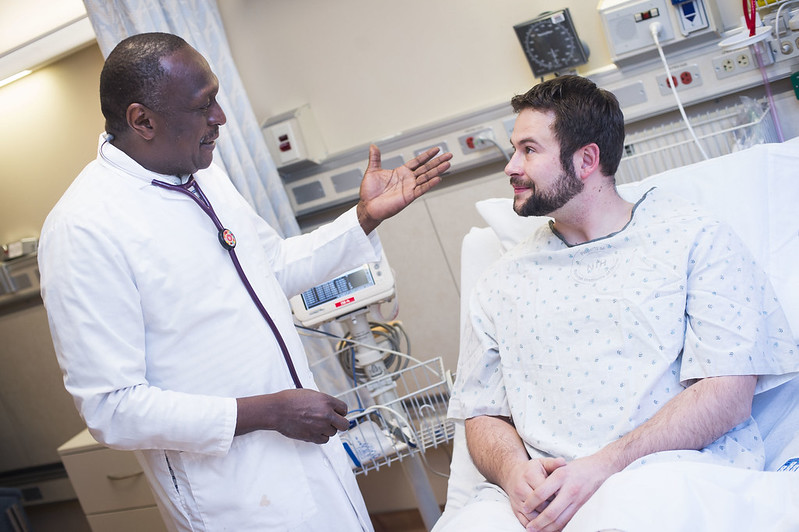“I understand we haven’t made things any easier for you. My words may not do much in that regard, but rest assured that we are here for you. All is well.”
I kept my tone measured and tried to maintain composure — my personal protective equipment, of sorts, although perhaps it was meant more for her protection than my own. She must be hearing the same sentiments constantly during her treatment, I thought. My words felt alien to me, given the day’s circumstances.
All was not well. It was almost 11 p.m. My day had been summed up by its fair share of struggles. I wanted nothing more than to finally be at home. I had a case to study for, supper to eat, and a mind that needed rest. Still, my patient needed me. Before me was Mrs. E, relentlessly pleading with me to write her discharge paperwork. I had just finished my routine check-up on another patient and was about to head out when she called out to me. I ended up spending almost half an hour assuring her I could not because I was a student and the hospital, like most institutions, is governed by strict protocols. I had already passed on her concerns to the relevant people, who advised that she be more patient. Patience — there was that word. It was a word she had undoubtedly heard time and time again, overworn in the context of her disease and by her providers.
Mrs. E, I came to learn, had been referred for a blood transfusion prior to undergoing a scheduled course of chemoradiotherapy for stage IIIB cervical cancer that she had been anticipating for almost ten days, as her hemoglobin level continued to plummet. In an attempt to embrace the rare opportunity to be helpful at the end of a day that had done its best to dissuade me, I settled on giving her the only thing I could at that moment: reassurance. My reassurance to her came after seemingly endless shuttling between the nurses’ station and her cubicle. Similarly, my mind had conjured up its own seemingly endless shuttle between thoughts of remorse for not telling her what I felt she needed to be told, and concerns of unprofessionalism for not telling her what I was supposed to. However, much to my astonishment, my words managed to calm her down.
I am currently in my sixth and final year of medical school training in Kenya. With the ongoing pandemic adversely affecting learning in hospitals, I have been spending a lot of time reflecting on previous patient encounters and how my preclinical years shaped my interactions with them. The transition from the countless hours spent on memorizing dizzying amounts of information during those years to more patient-centered clinical years brought a soothing satisfaction. Other than the inevitable moments during rounds of being grilled on theoretical material, I have come to learn that I can be a competent doctor without having to recall any of the complement pathway or the Krebs cycle. As grueling as the theory-laden part of my medical school training was, what it could not naturally ingrain in me were the most invaluable lessons in the practice of medicine.
The art of showing genuine empathy while maintaining the utmost professionalism. The art of knowing what should take precedence between what a medical professional has to say, and what a patient needs to hear. The art of making peace with the fact that at times, against my better judgment, I may have to rely on my clinical intuition to guide my clinical decision-making process. All these lessons are better learned in the hospital setting by interacting with real patients. “The real learning begins after completing your studies and continues throughout your career,” my practicing lecturers always insisted. Though still months away from officially getting M.D. after my name, that lesson has become resoundingly resonant with me.
Mrs. E was a victim of a critical shortage in donated blood that grappled my country. While the hospital was doing its best to source for donors, she was left relying on hematinics. That, coupled with her underlying condition, had gradually driven her to the limit of impatience. She was scared. She felt neglected. She felt unheard. My reassurance alone proved helpful in enabling her to stay the night, during which she luckily received two units of blood. On checking up on her the following day, I was humbled by her blessings interspersed between showers of gratitude. She confessed to me that my words had given her the hope to keep fighting to live another day. This unlikely interaction helped me rediscover why I always dreamt of becoming a doctor. More than relieving the suffering of my patients, I had a duty to make them feel heard — to assure them that even if all else fails, I was right there with them, every step of the way.
While she unknowingly made me look forward to my future as a doctor, Mrs. E also made me acutely aware of the power hidden in kind words. Kind words are therapeutic; they possess an innate restorative quality. They offer a hand to grab onto when our patients are drowning. They are a remedy that is usually overlooked in a profession emblemed with the unspoken demand of getting things done. There will be times that they are all I can offer to my patients. Nevertheless, they will be exactly what my patients need.
Mark Twain, an author whose books I binged during my high school years, said in one of his letters that he could live on a good compliment for two weeks with nothing else to eat. Our patients can live on kind words for much longer than we think.
Image credit: Patient Talking With Doctor by NIHClinicalCenter licensed under CC BY-NC-ND 2.0 license.








